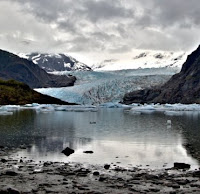Mountain glaciers move slowly and it has been hard to pin an individual glacier's retreat to a change in global climate. A new method finds that for most of the glaciers studied, the observed retreat is more than 99 percent likely due to climate change.
Mountain glaciers have long been a favorite poster child of climate change. The near-global retreat of glaciers of the last century provides some of the most iconic imagery for communicating the reality of human-driven climate change.
But the scientific basis for their retreat has been less clear. Glaciers respond slowly to any climate changes, they are susceptible to year-to-year variations in mountain weather, and some of the largest are still catching up after the end of the Little Ice Age. Scientists can connect climate change to the overall retreat of glaciers worldwide, but linking an individual glacier's retreat to climate change has remained a subject of debate.
The last report from the Intergovernmental Panel on Climate Change concluded only that it was "likely" that a "substantial" part of mountain glacier retreat is due to human-induced climate change — a much weaker conclusion than for other things, like temperature.
Now, using statistical techniques to analyze 37 mountain glaciers around the world, a University of Washington study finds that for most of them the observed retreat is more than 99 percent likely due to climate change. In the climate report's wording, it is "virtually certain" that the retreat of these mountain glaciers is due to climate change over the past century.
Read more at Mountain Glaciers Are Showing Some of the Strongest Responses to Climate Change

No comments:
Post a Comment